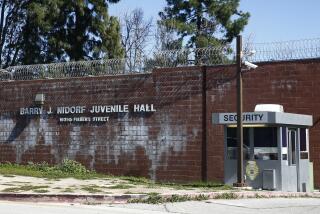Conversation With Barry J. Nidorf : ‘Parents Must Show Children That Misbehavior Is Not Permitted’
- Share via
Barry J. Nidorf, chief probation officer for Los Angeles County, recently studied the delinquent children who enter his system and found that just 16% cause a staggering two-thirds of his department’s long-term costs. Nidorf says these serious repeat offenders, who generally go on to become society’s career criminals, are a small and easily identifiable group whose numbers could be significantly reduced. He was interviewed by Jill Stewart.
Question: Are you proposing a new government agency to tackle the problem of high-risk kids who become society’s career criminals?
A: No, we’re seeking funding for a pilot program that would use a consortium of people from leading government agencies and community groups who would analyze each child’s case and refer the child to help at agencies that already exist. This individual assessment of the child and family would be followed by some sort of guarantee of treatment. We hope to get funding from the federal crime bill and from charitable foundations.
Q: Why are kids changing and becoming a major criminal force, when it used to be rare for a child to commit serious crime?
A: It didn’t happen overnight, but the institutions that brought up kids, from parents to churches to schools to government welfare, have all deteriorated. Unfortunately, the era in which women left the home and entered the work force can be directly tied to the time when society began to lose control over kids.
Q: Explain how your early prevention program for little children would work.
A: Prevention means intervention. We are proposing a new approach to provide kids what they are lacking, meaning recreation, remedial training for learning deficiencies, socialization skills, exposure to the beaches, mountains, all the things kids used to do 20 years ago. It’s a matter of showing that someone cares about a kid, instead of the approach now, which is that society says it cares, but just doesn’t have the time.
Q: Since small children haven’t committed crimes yet, how do you know which grade school and preschool kids to target?
A: Their characteristics are all the same. They have school problems, poor peer relationships, drug or alcohol abuse in the family and sometimes mistreatment by parents. If we have a file on a kid that shows these things, we can commit resources before they commit their first delinquent act.
Q: What can parents do if their child seems headed for trouble?
A: Don’t throw up your hands. The child needs a face-to-face talk. Many agencies can help parents, and parents must act to show children that consequences will occur and misbehavior is not permitted. Of course, no amount of talking is going to change the fact of a 14-year-old charged with murder. But in preschool and grade school we can have a tremendous effect.
Q: According to the Rand Corp., juvenile delinquents have moved beyond low-level crimes like joy-riding or shoplifting because now kids often have guns, and guns mean that far more serious crimes will be committed.
A: Kids have no fear of firearms like adults do, and no understanding whatsoever of consequences. Kids who are well into our detention system talk about killing three or four people without any feeling because they saw somebody shot on TV who just got up and walked away. Add to that the incredible availability of guns now, compared to 20 years ago, and you have kids who don’t think twice before they use a gun.
Q: Could curfew work as a society-wide intervention program?
A: Curfew is an important tool because when kids are unsupervised on the streets, they get in trouble. Not even the best parents can control a kid if they aren’t around to do it.
Q: Since the “three strikes and you’re out” law passed, statistics have emerged showing that surprisingly few people over the age of 30 commit serious crimes, which suggests that it’s pointless to imprison people into old age. So what should society do?
A: That’s true, but you can’t just say let them outgrow it, because up to age 30, young people cause so much damage it’s intolerable. If you intervene with that 12-year-old, odds are good you won’t need to imprison him later.
More to Read
Sign up for Essential California
The most important California stories and recommendations in your inbox every morning.
You may occasionally receive promotional content from the Los Angeles Times.













